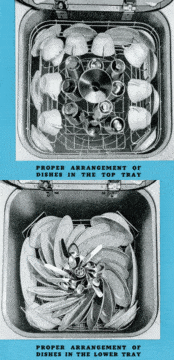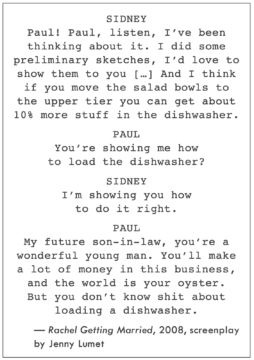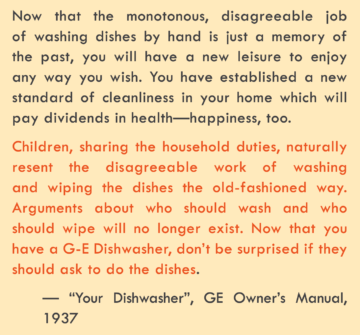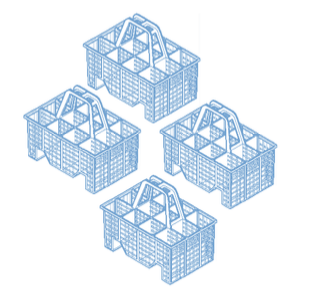by Danielle Spencer

My parents keep an official list of “Things We Disagree About.” There are many prerequisites for a disagreement to make the list, but the most important is that it must be both meaningful and intransigent. They tend to maintain a cheerful agreement about the list rankings, which evolve over time—though the number one slot is always the same: the designated hitter rule in baseball. My mother is anti, my father pro, and never the twain shall meet (though the twain shall probably never stop debating it).
Now, the DH rule doesn’t come up so often in everyday life, or at least not much in the off-season. But there’s one item that does arise all year round, one that’s part of their shared lives, every day. When we open this Pandora’s box and slide out the top drawer, we start plucking out matters of taste and preference; but if we reach in for the larger bottom drawer, we find ourselves hefting the unwieldy building blocks of their respective ideologies. This issue is a daily enactment of—and metaphor for—their lives together. It is a timeless debate: How to load the dishwasher.
In fact they do agree about some of the basics. To pre-rinse or not to pre-rinse: that is a question so fundamental that it’s hard to imagine how any couple can successfully straddle the divide. Thankfully my parents, for the most part, both come down peaceably on the no pre-rinsing side. But then what typically happens is that my father loads the dishwasher somewhat haphazardly, using perhaps half of the dirty dishes piled on the counter and absently adding some wood-handled knives. When, with blissful satisfaction, he starts to close it, my mother intervenes. “You can fit so much more,” she mutters, busily re-ordering and compacting the plates, adding all the remaining dishes from the counter and removing the knives. Of course she’s right—she can usually fit about twice as much as he does—but inevitably he stands in a pool of annoyance, watching her re-do his labors.
 This scene repeats every evening, like a syndicated sit-com. Let me just interject that my parents do in fact agree about a great many essential matters. Legions of my and my brother’s friends—children of a generation of divorce—have trekked to sit in our kitchen and listen to their advice on how to nourish a long-term marriage. What makes the dishwasher drama replay so consistently through the years is that it is, at its core, about something central to their relationship: meaningful difference.
This scene repeats every evening, like a syndicated sit-com. Let me just interject that my parents do in fact agree about a great many essential matters. Legions of my and my brother’s friends—children of a generation of divorce—have trekked to sit in our kitchen and listen to their advice on how to nourish a long-term marriage. What makes the dishwasher drama replay so consistently through the years is that it is, at its core, about something central to their relationship: meaningful difference.
My mother was raised Episcopalian in Wyoming and South Dakota. Her great-great-grandfather was named after a president, orphaned at a young age and eventually settled in Iowa to become a businessman. His obituary in the Mount Pleasant Free Press in 1874 opined that “his pecuniary success in life is but another illustration of the possibilities of this free and wide extended country to every industrious and enterprising young man in the land, success being simply a question of time occupied in honest and continuous effort and labor.” This ethic translated down through the generations to the Little Women-esque maxim which I associate with my maternal grandmother: “Anything worth doing is worth doing well.”
My father—born of first-generation Ashkenazi immigrants, raised in Queens, never traveled west of Newark until he was grown—thinks this adage is hilarious. Given half a chance, he’ll add his own formulation: “Anything worth doing is worth doing badly,” he’ll bray gleefully, while my mother rolls her eyes. For years I didn’t understand the dishwasher debate until I realized that he takes active pleasure in doing it badly, in not having to do it well. There are any number of things he’s done well—proven many mathematical theorems, taught a long line of students—but this isn’t one of them.
 In loading the dishwasher my parents have to arrive at a truce, even if that means that they essentially load it twice over every night. That’s what relationships are: you have to try to fit all the pieces together in the same box. In these parlous times it’s undoubtedly frivolous to linger over an issue spinning around bougie privilege, but such domestic contretemps often inflect our daily lives, especially as many of us have spent so much of the pandemic at home. If we ask ourselves what’s at stake with these quotidian quandaries—from gender roles to views on technology, power relations, agency, aesthetic aspirations—maybe we can gain greater insight and understanding. And if we make some headway in the domestic sphere, perhaps we can work towards more harmoniously sharing the duties and benefits of civic life.
In loading the dishwasher my parents have to arrive at a truce, even if that means that they essentially load it twice over every night. That’s what relationships are: you have to try to fit all the pieces together in the same box. In these parlous times it’s undoubtedly frivolous to linger over an issue spinning around bougie privilege, but such domestic contretemps often inflect our daily lives, especially as many of us have spent so much of the pandemic at home. If we ask ourselves what’s at stake with these quotidian quandaries—from gender roles to views on technology, power relations, agency, aesthetic aspirations—maybe we can gain greater insight and understanding. And if we make some headway in the domestic sphere, perhaps we can work towards more harmoniously sharing the duties and benefits of civic life.
 Next time you’re at friends’ house for dinner, ask them if they have a particular domestic disagreement that plays out on a regular basis. More often than not you’ll incite an animated and passionate debate (and perhaps some animated and passionate dish-throwing) which bores straight to the heart of their respective ethics and their capacity for compromise. As you unload and load their values and heritage and character traits into your analysis, remember: meaningful difference is key. Just be sure to fit in as much as you can.
Next time you’re at friends’ house for dinner, ask them if they have a particular domestic disagreement that plays out on a regular basis. More often than not you’ll incite an animated and passionate debate (and perhaps some animated and passionate dish-throwing) which bores straight to the heart of their respective ethics and their capacity for compromise. As you unload and load their values and heritage and character traits into your analysis, remember: meaningful difference is key. Just be sure to fit in as much as you can.
